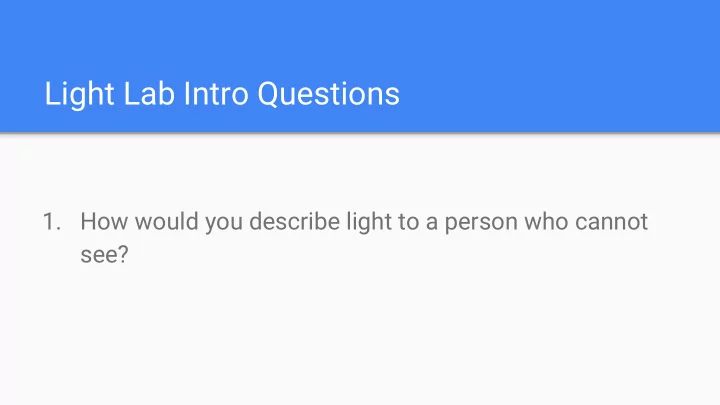

Light Lab Intro Questions 1. How would you describe light to a person who cannot see?
Exploring the Properties of Light
Why are we studying the behavior of light? ● Most what we know about space comes from studying light! Not just visible light but all wavelengths on the electromagentic spectrum. ● Understanding how light behaves will help us to explain phenomena observed while studying cosmology and astronomy.
Big Bang Theory Evidence-based explanation about origins of Universe Behavior of light energy (both visible and non-visible) gives information about: Composition of the universe ● Movement of objects in the universe ● Leftover energy from Big Bang event ●
We will be exploring 5 properties of light… ● Absorption ● Reflection ● Refraction ● Diffraction ● Radiation
...but first.. We must understand that these properties exist because light behaves as a wave!
Light as a Wave Because light behaves like a wave (and not as a tiny physical particles) it demonstrates the 5 unique properties that we will be exploring today.
Absorption Describes how light waves can be absorbed and converted into energy
Reflection ● If an object does create any of its own light, then it must reflect light in order to be seen
Reflection ● Occurs when incoming light bounces off of an object ● Light can reflect off of smooth surfaces at predictable angles
Refraction Light waves change speed and direction as they pass through different mediums.
Refraction ● Refraction occurs at the boundary between two mediums ● The different speed at which light can travel through the new medium causes the light wave to change directions
Diffraction Diffraction occurs when waves pass around objects or through narrow openings.
Diffraction ● Waves spread out or disperse when they pass around an object or through an opening The amount of diffraction depends on wavelength ●
Diffraction
Radiation The emission and propagation of energy waves. Light intensity decreases with distance according to the Inverse Square Law.
Radiation ● Visible light is only a small portion of EM radiation ● Examining light intensity models the concept of radiation (the emission or transmission of energy in the form of waves); specifically we have examined the behavior of light intensity radiation in relation to distance
Recommend
More recommend